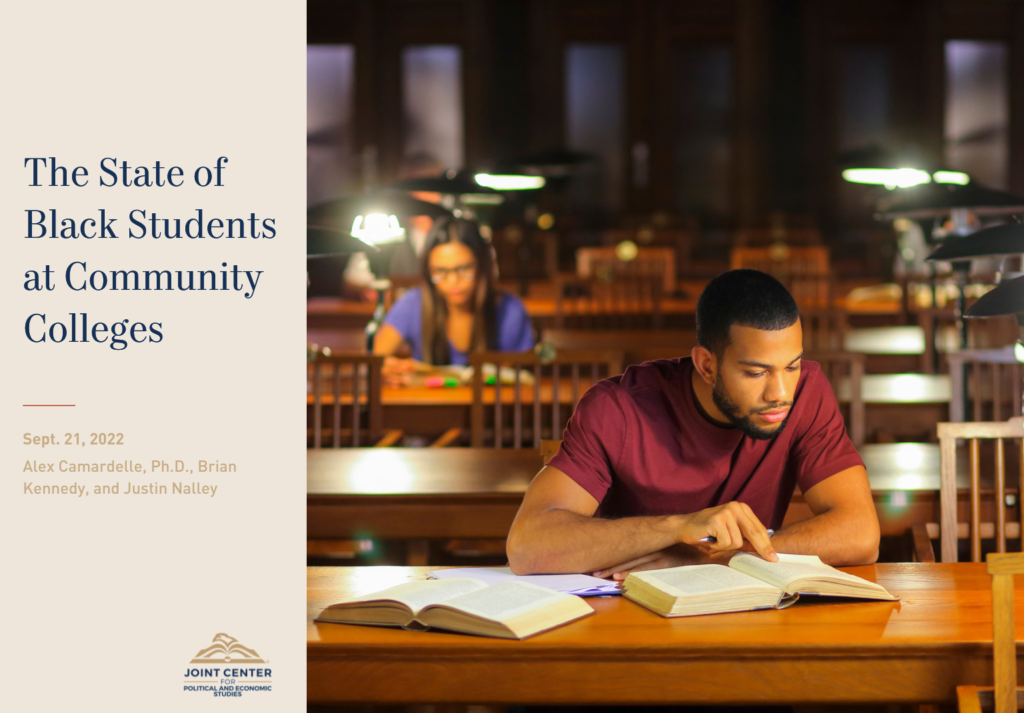Workforce Policy

Joint Center Releases New Report on the State of Black Students at Community Colleges
FOR IMMEDIATE RELEASE
September 21, 2022
CONTACT:
Chandra Hayslett, chandra@jointcenter.org
Valerie Jean-Charles, vjeancharles@fenton.com
Washington, D.C. — Today, the Joint Center for Political and Economic Studies released a report on the state of Black students at community colleges, including educational and economic outcomes. The report, “The State of Black Students at Community Colleges,” highlights that while Black students are disproportionately represented at community colleges, policy barriers prevent the system from producing equitable outcomes. This report was featured in Inside Higher Ed.
Community colleges play an integral role during economic downturns and are potentially vital in the country’s current economic recovery from COVID-19. Given Black adults are facing high unemployment rates through the continued pandemic, targeted support to strengthen community colleges across the nation would greatly benefit Black communities.
“Black workers are struggling to make ends meet during this health and economic crisis. Community colleges provide a path forward to ensure workforce readiness for all, but there are barriers holding back Black students from reaching their full potential,” said Dr. Alex Camardelle, director of Workforce Policy, Joint Center. “On average, Black students at community colleges experience lower graduation rates and earn tens of thousands of dollars less after graduation while having to take on more debt than their peers to pay for school. It doesn’t have to be this way. With targeted basic needs support, child care, improved transfer pathway policies, and better evaluations of community college outcomes by race, our policymakers can do right by Black community college students. And the biggest takeaway of all — making community colleges tuition-free will benefit Black students the most.”
Here are some key takeaways from today’s report on the state of Black students at community colleges:
- Black student enrollment at community colleges has steadily declined over time and has dropped during the COVID-19 pandemic. From fall 2019 to fall 2021, enrollment fell 18 percent for all Black students and 23.5 percent and 15 percent for Black men and Black women, respectively.
- Black community college students experience the lowest graduation rates when compared to their peers of other races and ethnicities. The gap between Black and white graduation rates more than doubled from a four percentage point gap in 2007 to an 11 percentage point divide in 2020.
- The typical Black community college graduate earns $20,000 less per year than their classmates. In fact, white households with workers who hold a high school diploma earn $2,000 more than Black community college graduates.
- Over two-thirds (67 percent) of Black students borrowed money to pay for community college compared to 51, 36, and 30 percent of white, Hispanic, and Asian students, respectively. Black community college graduates owe 123 percent of the original amount they borrowed 12 years after beginning their community college journey.
To help address these racial disparities at community colleges, the Joint Center made the following recommendations:
- Improve access to basic needs support for Black students to address issues like housing and food insecurity. Basic needs insecurity is closely associated with enrollment declines.
- Improve access to campus-based child care. Though many Black student parents enroll in community college, the lack of support for parents makes it more challenging to complete a credential.
- Strengthen transfer pathways. Black students experience barriers to transfer success. Policies that guarantee students will receive credit for any courses taken for their general education core or associate degree would be a step forward.
- Evaluate community college outcomes by race and ethnicity. Analyzing data to reveal inequities among students can help uncover barriers to racial equity in higher education.
- Make two-year community college tuition-free. Black students still shoulder the most debt at community colleges. The Biden administration campaigned to make two years of college tuition-free and should work with Congress to make good on that promise.
This report was authored by the Joint Center’s Workforce Policy team: Dr. Alex Camardelle, Brian Kennedy II, and Justin Nalley. Our Workforce Policy research centers Black communities in policy debates concerning the future of work, workforce development, and access to good jobs.
A full copy of today’s report is available here.
About the Joint Center for Political and Economic Studies
The Joint Center for Political and Economic Studies, America’s Black think tank, provides compelling and actionable policy solutions to eradicate persistent and evolving barriers to the full freedom of Black people in America. We are the trusted forum for leading experts and scholars to participate in major public policy debates and promote ideas that advance Black communities. We use evidence-based research, analysis, convenings, and strategic communications to support Black communities and a network of allies.

